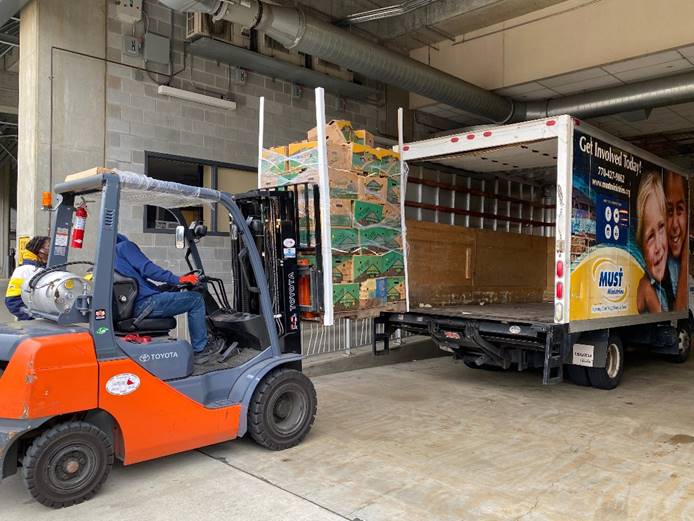
On Sept. 16, 2021, after 15 months, the operations of the Cobb Community Food Fleet will come to an end.
Since the end of May of 2020, a group of nonprofits, churches, businesses, and government entities has been responsible for the receipt and distribution of 168,000 boxes of food being received and distributed throughout Cobb County and beyond. That equates to 4.4 million pounds of fresh produce and proteins, the equivalent of nearly 3.7 million meals.
The group that has become known as the “Cobb Community Food Fleet” includes 14 organizations that picked up the food from Truist Park, the Galleria, the Cobb Energy Centre, and Sweetwater Mission, subsequently delivering it to over 50 other fleet members (primarily churches and other nonprofits) throughout the county. S.A. White and Mobilized Fuels provided the diesel needed to run the trailers; refrigeration was never lacking.
The effort has been a joint initiative of Cobb Community Foundation and Noonday Association of Churches. Costs were largely underwritten by the Atlanta Braves, who also contributed the use of the stadium’s massive refrigerator and loading docks as the first distribution center. Cobb County’s Board of Commissioners provided CARES Act and ARP Act funding of $540,000 to purchase food boxes, but the vast majority of the food was provided through the USDA’s Farmers to Families program.

What made Cobb such an attractive partner for the program’s food distributors was having a central distribution center at easily accessible facilities with subsequent deliveries throughout the entire county being handled by others. In this case, a “fleet” of nonprofits.
The need for a centralized distribution center went away when the USDA’s Farmers to Families program ended, but the need for food remains. Cobb Community Foundation took this issue to the Cobb Board of Commissioners earlier this year. The Board of Commissioners ultimately allocated $1.5 million of American Rescue Plan funding for the purchase of food by Cobb nonprofits.
Says Shari Martin, President and CEO of Cobb Community Foundation, “We will continue to work to ensure that food remains available when needed and where needed.” To that end, Noonday Association of Churches, the Atlanta Community Food Bank, and Cobb Community Foundation are working on an upcoming event for all nonprofit food providers at which attendees will be presented with census tract-level data on food insecurity to explore opportunities for collaboration.



